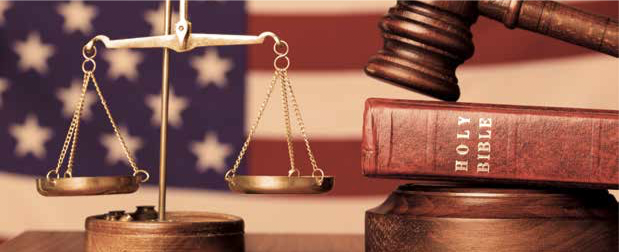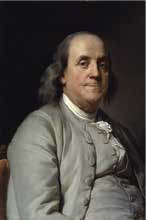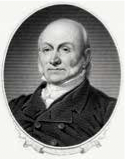Part Two: The Biblical Practice of Government
Chapter 7: Biblically Assessing the U.S. Constitution
Psalm 33:12 begins, “Blessed is the nation whose God is the Lord.” Is our nation’s government based on Biblical principles? President Truman believed so when he said, “The fundamental basis of this Nation’s law was given to Moses on the Mount. The fundamental basis of our Bill of Rights comes from the teachings which we get from Exodus and St. Matthew, from Isaiah and St. Paul.”[43] 43. “Address Before the Attorney General’s Conference on Law Enforcement Problems,” Truman Library,http://trumanlibrary.org/publicpapers/viewpapers.php?pid=657. In this chapter we will discuss the ways in which the U.S. Constitution provides the structural framework for and guards the Biblical foundation of God-given unalienable rights found in the Declaration of Independence.
Protects Our God-Given Rights Against Tyranny
The Founders believed that human nature is a mixture of good and evil and is not perfectible during life on Earth, as evidenced by this statement in Federalist 55: “There is a degree of depravity in mankind which requires a certain degree of circumspection and distrust.” Therefore, they held that a written constitution was necessary to protect our God-given rights from the potentially destructive fallen state of man (Jeremiah 17:9). As Thomas Jefferson said, “In questions of power, then, let no more be heard of confidence in man, but bind him down from mischief by the chains of the Constitution.”[44] 44. Founders’ Quotes, http://foundersquotes.com/quotes/in-questions-of-power-then-let-no-more-be-heard-of-confidence-in-man/.

The U.S. Constitution specifically protects our unalienable rights by (1) diluting/dividing and defining/limiting government power (all powers are enumerated; divided into three separate branches, each with checks and balances against the others; system of federalism further divides/ decentralizes power); (2) establishing a democratic constitutional republic[45] 45. While Federalist #10 speaks to the perspective that the writers of the Constitution were not set on creating a democracy, it surely is clear from their life actions and writings that they valued human responsibility and thus the need that “the people” have the ability to cast their own individual votes. While the Founding Fathers may not have written anything specifically stating that the US is a “democratic constitutional republic,” it is how our government has come to function—everyone gets a vote in choosing representatives. It should be mentioned that there is a great difference between a “democratic constitutional republic” and a “democratic republic.” A democratic republic is not usually (especially in present times) a democracy or a republic, but rather, a dictatorship. —everyone gets an equal voice with equal rights and no special privileges (system of electing leaders is established); (3) securing unalienable rights against encroachment by both the government and the majority (enumerated powers and Bill of Rights). The Preamble of the Constitution describes its purpose: “Secure the Blessings of Liberty to ourselves and our Posterity.” Founding Fathers James Madison and John Adams warned of the dangers of a system in which the majority was allowed to infringe upon the rights of the minority: “The invasion of private rights is chiefly to be apprehended, not from acts of Government contrary to the sense of its constituents, but from acts in which the Government is the mere instrument of the major number of the Constituents”[46] 46. The Federalist Papers Project, http://www.thefederalistpapers.org/founders/madison/james-madison-wherever-the-real-power-in-a-government-lies-there-is-the-danger-of-oppression. and “that the desires of the majority of the people are often for injustice and inhumanity against the minority, is demonstrated by every page of the history of the whole world”[47] 47. http://taxteaparty.com/republic. ; (4) requiring all federal and state officials—both civil and military—to take an oath to support the Constitution only. (Military officers, ultimately controlled by the Constitution, must be obedient to the president only as his orders do not violate the Constitution. Any orders by government officials that contradict the Constitution are automatically null and void from the start and are to be resisted by the other officials, federal and state, civilian and military.) Any violation of the oath of office is “treasonable usurpation upon the power and majesty of the people”[48] 48. “Principle Four,” The American Ideal of 1776, http://www.lexrex.com/enlightened/AmericanIdeal/yardstick/pr5.html. (Alexander Hamilton). Morality does not permit violating your oath of office to accomplish some good because the end does not justify the means. Usurpation by an oath-breaking public official is therefore immoral, unconstitutional, lawless, anti-republic, anti-liberty, and anti-American. Oath-breaking officers are hostile to the security of the God-given rights of every individual, the principles of the Declaration of Independence, and everything that America stands for.
Reflects a Biblical Worldview
Man was created to be motivated to action by self-interest (i.e., he has reason). However, due to the Fall, man is by nature sinful and unable to please God (Romans 7:18), leading to a corruption of some of his reasoning ability. The only way to salvation and the eventual restoration of perfect reasoning is through the Word of God (John 1; 3:16). Since man is incapable of completely conforming to the law of God in this life, civil rulers and their subjects must check each other’s power. James Madison acknowledged this in Federalist 51: “But what is government itself, but the greatest of all reflections on human nature? If men were angels, no government would be necessary. If angels were to govern men, neither external nor internal controls on government would be necessary. In framing a government which is to be administered by men over men, the great difficulty lies in this: you must first enable the government to control the governed; and in the next place oblige it to control itself. A dependence on the people is, no doubt, the primary control on the government; but experience has taught mankind the necessity of auxiliary precautions.”
When the power of the government is weak relative to that of the people, the evils of anarchy result (Articles of Confederation). When the government becomes too strong, tyranny results (British Crown). The U.S. Constitution provides a more balanced system in which the government and the people can pursue their interests while checking each other’s corrupting tendencies. This is in contrast to tyrannical political systems (such as socialism and communism) that are based on the lie that man’s motivation to pursue his own interests is a defect of human nature and must be corrected by governmental force.
The Constitution also follows the Biblical concept of covenant. Samuel Rutherford in Lex Rex stressed that governments derive authority from God (Romans 13:1-4) and that the details and administrators of that government are established by the people. (They are accountable to God for their government, as evidenced by the fact that God will judge a nation for the actions of its government.) The people make a covenant with God when they establish their government and rulers, and their rulers in turn make a covenant with the people and God to serve as God’s servants within the bounds of the law the people have made in covenant with God. The American covenant between the people and God is found in the Declaration of Independence (see chapter 6), and the covenant between the federal government and the people is found in the Preamble to the U.S. Constitution: “We the people of the United States … do ordain and establish this Constitution for the United States of America.” The covenant between the people and their rulers takes place when leaders take their oath of office.
Biblical teachings on caring for the poor are also reflected in the Constitution. The Founders recognized that God wants us to help the poor and underprivileged. However, they also firmly believed in the teachings of 1 Thessalonians 4:9-12 and 2 Thessalonians 3:6-10. Benjamin Franklin wrote:

| To relieve the misfortunes of our fellow creatures is concurring with the Deity; it is godlike; but, if we provide encouragement for laziness, and supports for folly, may we not be found fighting against the order of God and Nature, which perhaps has appointed want and misery as the proper punishments for, and cautions against, as well as necessary consequences of, idleness and extravagance? Whenever we attempt to amend the scheme of Providence, and to interfere with the government of the world, we had need be very circumspect, lest we do more harm than good.[49] 49. Historic Words, http://historicwords.blogspot.com/2009/07/benjamin-franklin-on-compassion.html. |
The Founders believed very strongly that under no circumstances is the federal government to become involved in public welfare. (James Madison: “Charity is no part of the legislative duty of the government.”) They felt it would corrupt the government and also the poor. No constitutional authority exists for the federal government to participate in charity or welfare. Franklin said:
I am for doing good to the poor, but I differ in opinion of the means. I think the best way of doing good to the poor, is not making them easy in poverty, but leading or driving them out of it. In my youth I travelled much, and I observed in different countries, that the more public provisions were made for the poor, the less they provided for themselves, and of course became poorer. And, on the contrary, the less was done for them, the more they did for themselves, and became richer.[50] 50. For more thoughts on the topic of the government providing for the poor, refer to David Barton’s excellent article in The Founder’s Bible titled: “How Are We to Help the Poor?” (337-340).
Finally, the Constitution reflects the Biblical “Newtonian” worldview of the Founding Fathers. They believed in a God who created the heavens and the earth and established fixed laws that govern both the physical world and humanity. These laws don’t change; therefore, the Constitution is valid for all ages. Col. John Eidsmoe discusses this in his book Christianity and the Constitution basically saying that modern men are Darwinians—they believe that life evolves, men evolve, society evolves, and therefore laws and constitutions evolve. Newtonians recognize change within cycles (cycles are due to natural laws). Darwinians hail change as the driver of perpetual change outside of the constraints of laws and cycles, leading to eventual perfection and utopia.[51] 51. John Eidsmoe, Christianity and the Constitution: The Faith of Our Founding Fathers (Grand Rapids: Baker Academic, 1995), 389-404 (paraphrase).
The Constitution is a charter adopted by the people for defining the framework of the federated system of government composed of the national and state governments. The charter, in and of itself, is not religious; though it is true that our nation’s founding philosophy is basically religious (see chapter 6), and the Constitution was designed to protect that philosophy. This is why it can be accurately stated that the United States of America is founded upon the Bible. Though it is not expressly a “Christian” nation, it is in effect a Christian nation by virtue of its founding principles.
President John Quincy Adams pointed this out when he said:
| The self-evident truths of the natural and unalienable rights of man … and the sovereignty of the people, always subordinate to the rule of right and wrong, and always responsible to the Supreme Ruler of the universe for the rightful exercise of that power. This was the platform upon which the Constitution of the United States has been erected.[52] 52. “Assault on America,” American Heritage Research, http://americanheritageresearch.com/assault-on-america/. | 
|
Not only did the nation see God and His Word as the foundation of the Constitution, they also saw Him as its Provider. The U.S. House of Representatives adopted a resolution on September 25, 1789, recommending that the president proclaim a day of Thanksgiving to God and prayer by the people of the entire nation, “acknowledging, with grateful hearts, the many signal favors of Almighty God, especially by affording them an opportunity peaceably to establish a Constitution of government for their safety and happiness.”
Summary
In this chapter we saw that the U.S. Constitution, though not expressly a Christian document, protects the Biblical truths of the Declaration of Independence from tyrannical government and reflects a Biblical worldview in how it governs the relationship between man and government.
↩ 43. “Address Before the Attorney General’s Conference on Law Enforcement Problems,” Truman Library, http://trumanlibrary.org/publicpapers/viewpapers.php?pid=657.
↩ 44. Founders’ Quotes, http://foundersquotes.com/quotes/in-questions-of-power-then-let-no-more-be-heard-of-confidence-in-man/.
↩ 45. While Federalist #10 speaks to the perspective that the writers of the Constitution were not set on creating a democracy, it surely is clear from their life actions and writings that they valued human responsibility and thus the need that “the people” have the ability to cast their own individual votes. While the Founding Fathers may not have written anything specifically stating that the US is a “democratic constitutional republic,” it is how our government has come to function—everyone gets a vote in choosing representatives. It should be mentioned that there is a great difference between a “democratic constitutional republic” and a “democratic republic.” A democratic republic is not usually (especially in present times) a democracy or a republic, but rather, a dictatorship.
↩ 46. The Federalist Papers Project, http://www.thefederalistpapers.org/founders/madison/james-madison-wherever-the-real-power-in-a-government-lies-there-is-the-danger-of-oppression.
↩ 47. http://taxteaparty.com/republic.
↩ 48. “Principle Four,” The American Ideal of 1776, http://www.lexrex.com/enlightened/AmericanIdeal/ yardstick/pr5.html.
↩ 49. Historic Words, http://historicwords.blogspot.com/2009/07/benjamin-franklin-on-compassion.html.
↩ 50. For more thoughts on the topic of the government providing for the poor, refer to David Barton’s excellent article in The Founder’s Bible titled: “How Are We to Help the Poor?” (337-340).
↩ 51. John Eidsmoe, Christianity and the Constitution: The Faith of Our Founding Fathers (Grand Rapids: Baker Academic, 1995), 389-404 (paraphrase).
↩ 52. “Assault on America,” American Heritage Research, http://americanheritageresearch.com/assault-on-america/.